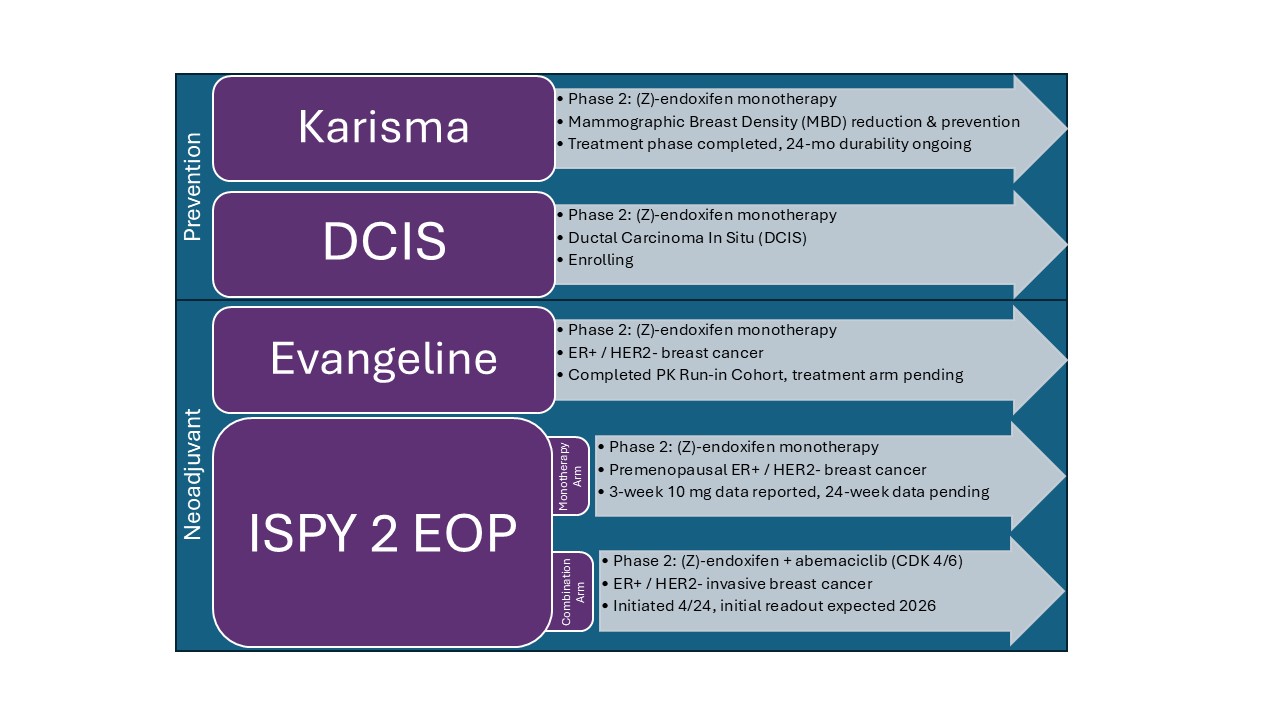control or without our consent, our business may be harmed. Furthermore, we conduct clinical trials in foreign countries, subjecting us to additional risks and challenges, including, patient and data privacy standards, such as GDPR and UK GDPR and in particular, as a result of the engagement of foreign medical institutions and foreign CROs, who may be less experienced with regard to regulatory matters applicable to us and may have different standards of medical care.
With regard to certain of the foregoing clinical trial operations and stages in the manufacturing and distribution chain of our compounds, we rely on vendors. In most cases we use a primary vendor and have identified, in some cases, secondary vendors. In particular, our current business structure contemplates, at least in the foreseeable future, use of a primary commercial supplier for the (Z)-endoxifen drug substance. The use of primary vendors for core operational activities, such as, manufacturing, and the resulting lack of diversification, exposes us to the risk of a material interruption in service related to these primary, outside vendors. As a result, our exposure to this concentration risk could harm our business.
In addition, our employees and personnel or our vendors or partners may use AI, including generative AI, technologies to perform their work or in their operations, and the disclosure and use of personal information in AI technologies is subject to various privacy laws and other privacy obligations. Governments have passed and are likely to pass additional laws regulating AI, controlling for data bias and antidiscrimination. Any use of this technology could result in additional compliance costs, regulatory investigations and actions, and consumer lawsuits.
We also rely on a third-party information technology vendor to oversee our information technology systems, including our mechanisms, controls, technologies, systems, and other processes designed to help prevent or mitigate data loss, theft, misuse, or other security incidents or vulnerabilities affecting our data and to help maintain a stable information technology environment. As a result, our cybersecurity systems and processes are dependent upon the performance of our information technology vendor.
Although we monitor the compliance of our third-party service providers performing the aforementioned services, we cannot be certain that such service providers will consistently comply with applicable regulatory requirements or that they will otherwise timely satisfy their obligations to us. We and our third-party service providers may be subject to inspections by FDA and other regulatory authorities. Any such failure by us or by our third party service providers to comply with applicable legal or regulatory requirements and/or any failure by us to monitor their services or to plan for and manage our short- and long-term requirements underlying such services could result in shortage of the required compound, delays in or cessation of clinical trials, failure to obtain or revocation of product approvals or authorizations, product recalls, withdrawal, administrative detention, seizure of products, suspension of an applicable wholesale distribution authorization, and/or distribution of products, operating restrictions, injunctions, suspension of licenses, other administrative or judicial sanctions (including warning or untitled letters, import alerts, civil penalties and/or criminal prosecution), and/or unanticipated related expenditures to resolve shortcomings.
Such consequences could have a significant impact on our business, financial condition, operating results, or prospects.
We may encounter delays in our clinical trials or may not be able to conduct our trials in a timely manner.
Clinical trials are expensive and subject to regulatory approvals. Potential trial delays may arise from, but are not limited to:
•supply chain disruptions, or lack of availability or increased costs of materials for our product candidates, including as a result of changes in trade policies, including tariffs or other trade restrictions or the threat of such actions;
•outbreaks of disease, pandemics or epidemics, which could limit access to clinical trial sites, divert healthcare resources and limit the availability of medical facilities for our clinical trials;
•failure to obtain on a timely basis, or at all, approval from the applicable Regulatory Agencies, institutional review board or ethics committee to open a clinical study;
•lower than anticipated patient enrollment or delays in patient enrollment, including due to the size and nature of the patient population, existing conditions, patient eligibility criteria defined in the protocol, proximity of patients to trial sites, the design of the trial, our ability to recruit clinical trial investigators with the appropriate competencies and expertise, competing clinical trials for similar or alternate therapeutic treatments, clinicians’ and patients’ perception of a lack of benefit to enroll in the study for whatever reason, our ability to obtain and maintain patient consents and patients dropping out of the trial;
•delays in reaching agreements on acceptable terms with prospective CRO or vendors;
•failure of CROs or other third parties to effectively and timely monitor, oversee, and maintain the clinical trials;
•the imposition of partial or full clinical holds by FDA, or the pausing or termination of our clinical trials by institutional review boards or ethics committees;
•complying with design protocols of any applicable special protocol assessment we receive from the FDA;
•severe or unexpected drug-related side effects experienced by patients in clinical trials;
•availability of materials provided by third parties necessary to manufacture our product candidates; and
